St John’s to welcome exceptional Gates Cambridge Scholars
"I am really honoured to be part of an international community driven by having an impact in the world around them"
"I am really honoured to be part of an international community driven by having an impact in the world around them"
Nine academically outstanding postgraduate students will be joining the St John’s community later this year as part of the Gates Cambridge Scholars programme.
The nine future Johnians were selected by the Gates Cambridge Scholarship Programme from a highly competitive pool of applicants for their academic achievements and their strong commitment to improving the lives of others. They will be studying for MPhils and PhDs on subjects ranging from Alzheimer’s disease to tribal property rights in India.
Stephen Toope, the Vice-Chancellor of the University of Cambridge and Chair of the Gates Cambridge Trustees, said: “The Gates Cambridge Scholars are an extraordinary group of people. Not only have they demonstrated outstanding academic abilities in their field, but they have also shown a real commitment to engaging with the world – and to changing it for the better.”
The Gates Cambridge Scholarship programme was established in October 2000 by a donation of $210m from the Bill and Melinda Gates Foundation to the University of Cambridge – the largest ever single donation to a UK university.
Scholarships are awarded to outstanding applicants from countries outside the UK to pursue a full-time postgraduate degree in any subject available at the University of Cambridge.
This year’s cohort of 90 Scholars includes citizens from 37 different countries and the first scholars from Burundi and Mongolia.
The nine international students joining St John’s come from six different countries and will take up the prestigious postgraduate scholarships in October.
Jascha Achterberg
PhD in in Medical Science at the MRC Cognition and Brain Sciences Unit
“I have always been interested in understanding the complex systems of everyday life from a quantitive point of view and studied the psychology of markets and behavioural economics when doing my undergraduate in Osnabrück, Germany.
Even though I enjoyed using behavioural research methods to design evidence-based policy interventions, I started to be more interested in the neuronal mechanisms behind human decision making – namely, how do we extract and process complex information in the first place?
One of the most uniquely human capabilities may be the general ability of dealing with novel situations and complex problems. In my PhD I want to explore the neuronal dynamics and information processing mechanisms underlying intelligent and structured behaviour.”
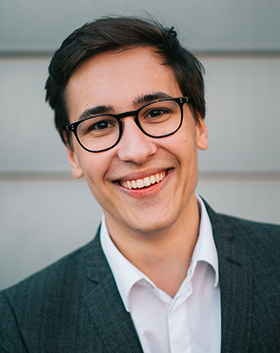
David (Gil) Damon
MPhil in Public Policy
“Growing up along the rural coastline of Northwest Florida, my community was often shaped by exchanges between science and government. When hurricanes approached, instruments aboard federal satellites, buoys, and aircraft enabled lifesaving forecasts.
To explore the complex interactions between scientific and political entities, I interned for a bipartisan pair of US senators, with a Florida representative, in the Obama White House, and twice for NASA. At Florida State University, I majored in political science and psychology to study both civic institutions and the minds influencing them.
Through my MPhil in Public Policy and immersion in the Gates Cambridge community, I’m eager to investigate the fusion of communications, science, and politics.”
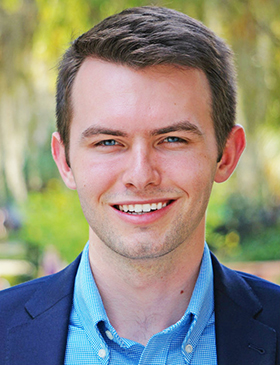
Nishant Gokhale
Certificate of Postgraduate Study in Legal Studies
“During law school at the National University of Juridical Sciences, Kolkata I met students from diverse backgrounds, including many from tribal communities in India. Their encounters with the law were vastly different from my own and there existed little in Indian law libraries to contextualise their experiences.
The reason for this lack of materials remained at the back of my mind for the several years that I worked as a Supreme Court judicial clerk, litigator and a researcher in India. Despite several legal protections and living on richly resourced lands, many tribes remain the worst off amongst India’s citizenry across various socio-economic indices.
My PhD at Cambridge will explore how colonial rule uniquely affected tribes in South Asia and also how tribes affected colonialism. It seeks to develop a “hybrid” legal history for tribes in India which views not only colonial law’s perceptions of tribes but also tribal perceptions of law and government.”
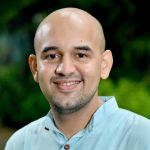
Dylan Griswold
PhD Clinical Neurosciences
“I’ve wanted to become a doctor since third grade. Although I was pre-med at Williams, I was also playing baseball, and my aspirations to continue playing after graduation began to take priority. I went to San Francisco the summer after my sophomore year in preparation for a professional tryout, but I tore a ligament in my elbow, requiring two surgeries.
Unable to pitch, I began looking for volunteer work and the following summer, I went to Haiti, where I was struck by the almost non-existent access to neurosurgical care. After spending the following year in the neurosurgery lab at UCSF, my desire to become a neurosurgeon was born.
As an MD, PhD candidate, I hope to become an academic leader capable of managing complex neurosurgical disease in addition to affecting policy to improve universal access to safe and affordable surgical care.”
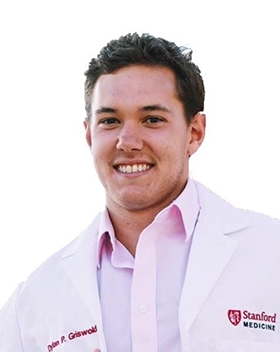
Davide Martino
PhD in History
“I was lucky to grow up in Italy first, then in Belgium, and when I made the leap across the Channel to study History at Cambridge I already saw myself as a European citizen. My fascination for the philosophes of the Enlightenment initially lured me towards the eighteenth century, but a combination of chance and opportunity led me to focus on the sixteenth and seventeenth centuries instead.
For my PhD I will cross not just national but also disciplinary boundaries, investigating the uses of hydraulic knowledge and expertise across three early modern cities, Florence, Augsburg, and Amsterdam. Retracing the careers of hydraulic experts responsible for monumental fountains and mundane sewage systems alike, my work will be at the crossroads between the history of science, art history, and environmental history.
In particular, I intend to contribute to the field of water history, which has very concrete implications for the present, and for ensuring that we can continue to hold water in shared and sustainable possession with fellow humans.”
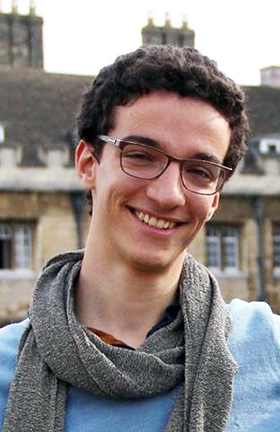
William McCorkindale
PhD in Physics
“After 4 physics-filled years at Cambridge alongside summer research at the Max Planck Institute for Plasma Physics and Caltech, I will be conducting a PhD under Dr Alpha Lee in computational drug design.
Mankind has so-far synthesised 10^8 compounds, which sounds like a lot, but it is estimated that there are at least 10^20 possible drug-like molecules. Many of these could be more affordable, effective pharmaceuticals – the challenge is in getting to them!
My PhD will attempt to achieve this by describing three-dimensional molecules in a continuous representation - the continuity of the representation allows it to be used as an input to conventional machine learning techniques for the prediction of novel drug candidates with optimal properties.”
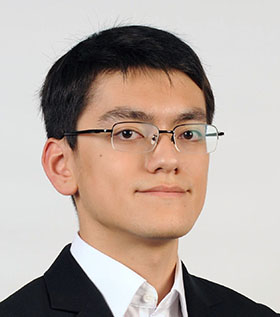
Annabelle Richard-Laferrière
PhD in Astronomy
"I have always been passionate by science to learn about and understand the Universe around us. I am delighted to pursue a PhD at Cambridge in Astronomy studying mechanisms enabling supermassive black holes to transfer energy to their surroundings.
In addition to my research, I want to get involved in astronomy outreach in my department and in the city as I am very passionate about communicating science to my peers as well as to the general public.
I want to encourage the curiosity of people especially children towards astrophysics and science. I also work to empower girls and women in physics, by helping in the creation of the Diversity Physics Committee at UdeM and participating to events for girls. I am really honoured to be part of the Gates Cambridge Community, an international community driven by having an impact in the world around them."
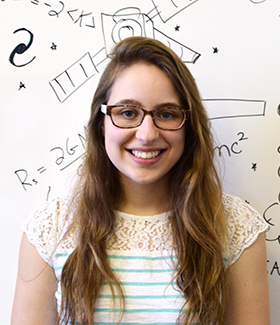
Dillon Rinauro
PhD in Chemistry
“Growing up in Bellingham, Washington, I developed a passion for elder care early on and it has since become an integral part of my life.
After graduating from high school, I moved to Los Angeles where I attended Loyola Marymount University to study biochemistry and conduct research on the pathogenesis of misfolding protein diseases, namely, type II diabetes and Alzheimer’s disease. I became increasingly interested in the latter as I frequently volunteered at a convalescent home for the elderly through the Ignatians Service Organization.
At Cambridge, I will be pursuing a PhD in Chemistry under the supervision of Professor Christopher Dobson where I will investigate the mechanism through which tau protein aggregates with emphasis on methods of inhibition for the treatment of Alzheimer’s disease.”
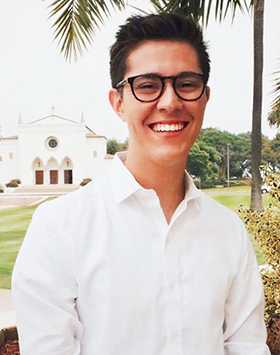
Gregory Serapio-García
PhD in Psychology
“A San Francisco Bay Area native, I grew up immersed in and fascinated by technology. Carrying this fascination with me to study Psychology and Computing and Digital Technologies at the University of Notre Dame, I won my first research grants to conduct a crowdsourced Internet study of personality and subjective well-being from around 9,000 participants in 105 nations and nine languages.
By pursuing a PhD in Psychology at Cambridge I will synthesise mobile-sensing and personality data to predict mental illness outcomes and subjective well-being. I hope to help automate lengthy mental health assessments through computational analyses of social media big data with Dr David Stillwell and colleagues at The Psychometrics Centre.
I want to use the data I have gathered for the social good. I hope to inform the next generation of the world’s best physicians, lawyers, philosophers, and educators of both the promise of online social data in transforming mental healthcare and the moral imperative to combat the exploitative use of big data in this proliferating field.”
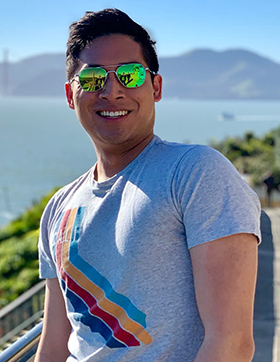
Published: 12/04/19